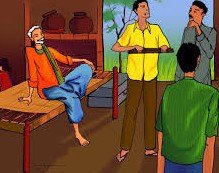In a quiet village surrounded by golden wheat fields and orchards heavy with fruit, there lived an old farmer named Harun. He had spent his entire life tilling the land, sowing seeds, and harvesting crops with unwavering dedication. His hands were rough from years of labor, but his heart was full of wisdom. Harun had three sons—Rohan, Karan, and Dev—who were strong and capable young men, but they constantly argued among themselves.
Each believed his way was the best, and their disagreements often turned into bitter quarrels that disrupted the peace of their home. The villagers often whispered about how such a wise man could have sons who failed to understand the value of unity, but Harun remained patient, waiting for the right moment to teach them a lesson they would never forget.
The farm had always been prosperous, but as Harun grew older, he worried about its future. He knew that if his sons continued to fight, all his hard work would crumble after his passing. One evening, as the sun dipped below the horizon, painting the sky in hues of orange and purple, Harun called his sons to his bedside. His voice was weak but firm as he spoke, “My sons, I do not have much time left in this world, and before I go, I must tell you something important.
” The brothers, though often at odds, gathered around their father, sensing the gravity of his words. Harun continued, “Beneath the old oak tree at the edge of our land, I have hidden a treasure. But you must work together to find it. If you fight, you will never uncover its secret.”
The next morning, filled with excitement and greed, the brothers rushed to the oak tree, each hoping to claim the treasure for himself. Rohan, the eldest, began digging furiously on one side, while Karan and Dev argued over where the treasure might be buried. Hours passed, and the once-fertile soil was torn apart in disarray, yet no treasure was found.
Frustrated and exhausted, they returned to their father, accusing him of lying. Harun, though weak, smiled gently and asked, “Did you work together, or did each of you dig alone?” The brothers fell silent, realizing their mistake.
Harun then handed each of them a single stick. “Break this,” he said. With ease, all three snapped their sticks in half. Then, he gave them a bundle of three sticks tied together. “Now, try to break this.” Rohan, the strongest of them all, strained but could not break the bundle.
Karan and Dev tried as well, but the sticks held firm. Harun’s eyes gleamed with wisdom as he said, “A single stick is weak and can be broken easily, but when bound together, no force can break them. This is the treasure I wanted you to find—the strength of unity.”
The brothers stood in silence, the weight of their father’s words sinking in. They had spent years fighting, weakening their family bond, when they could have been unbreakable together. From that day forward, they worked as one—plowing the fields, planting seeds, and harvesting crops in harmony.
The farm flourished more than ever, and the villagers marveled at the change. Even after Harun passed away, his sons kept his lesson alive, passing it down to their children and grandchildren.
This story, though simple, carries a universal truth that transcends time—unity is strength. Whether in families, communities, or nations, those who stand together withstand the greatest challenges. The farmer’s tale is not just about sticks and treasure; it is a metaphor for life itself.
When people divide, they become vulnerable, but when they unite, they become invincible. This lesson has been echoed throughout history—from ancient civilizations that built wonders through collective effort to modern societies that overcome crises through solidarity.
What many don’t know is that variations of this story exist in cultures worldwide. In Africa, it is told with a bundle of arrows; in Japan, with reeds by a river. The core message remains the same—strength lies in togetherness.
Another lesser-known detail is that the story symbolizes not just physical unity but emotional and intellectual harmony. A family that supports each other’s dreams, shares burdens, and celebrates victories together is truly unbreakable.
The farmer’s story also teaches patience and wisdom. Harun could have scolded his sons or forced them to cooperate, but instead, he allowed them to fail and learn on their own. Sometimes, the most powerful lessons come not from words but from experience.
This is why the tale has endured for centuries—it speaks to the heart, reminding us that no matter how capable we are alone, we are always stronger together.
In today’s fast-paced world, where individualism is often celebrated over collaboration, this ancient fable remains relevant. Families drift apart, workplaces become competitive battlegrounds, and societies fracture along lines of difference.
Yet, history has shown time and again that unity is the cornerstone of survival and progress. The farmer’s story is a call to remember that—whether in moments of conflict or times of peace—our greatest power lies in standing together.
The next time you face division, remember the old farmer and his sons. Ask yourself: Are you a single stick, easily broken, or part of an unbreakable bundle? The choice determines not just your fate, but the legacy you leave behind. Unity is not just strength—it is the foundation of a lasting and meaningful life.
Go to main page


